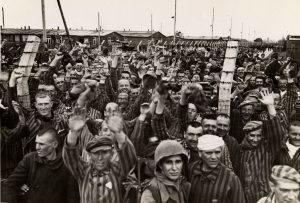Epilogue: Looking Back as We Move Forward

Prisoners from the Allach concentration camp, the largest subcamp of Dachau, celebrate their liberation by American soldiers, April 30, 1945. Photo credit: USHMM #49653
On June 26, 1945, after the Allied liberation of the concentration camps and the defeat of the Nazis, 51 countries came together to form the United Nations (UN). The establishment of the UN was a catalyst for building human rights protections, including the Universal Declaration of Human Rights, the International Covenant on Civil and Political Rights, and the International Covenant on Economic, Social, and Cultural Rights. Additionally, Raphael Lemkin, a Polish Jewish lawyer and a Holocaust survivor who coined the term “genocide,” conceived of and drafted the Convention on the Prevention and Punishment of the Crime of Genocide (Genocide Convention).
Germany was also held responsible for its murder and brutalization of millions in the years after the war ended. Between November 1945 and October 1946, the Allies prosecuted Nazi military leaders, camp officers, doctors, propagandists, and German business leaders during the Nuremberg Trials. Civilians were also forced to expunge Nazi party members from all layers of German society. This program, titled “Denazification,” included comprehensive reeducation programs, institutional reforms, the renaming of streets, parks, and buildings, as well as the removal of Nazi monuments and symbols from civic life. Justice for victims was also sought and gained from the German government (in the form of monetary reparations) during the postwar years.
In the 1950s and 1960s, the Holocaust’s philosophical and religious implications came to the fore, with a scholarly focus on the discovery and documentation of Nazi crimes. Since then, the field has expanded to include the study of other genocides, inspiring a new generation of educators, practitioners, and policymakers to work towards the prevention of mass atrocities. Researchers also continue to unearth new data about what happened in small towns across the European continent, as well as learn more about the Nazis’ motivations.
In the decades since the end of World War II, survivors, activists, community groups, and non-governmental organizations have been working to preserve the history, lessons, and collective memory of the Holocaust. These include museums, memorials, and educational outreach programs that are emphasizing the importance of empathy and tolerance in promoting human rights. In addition, social justice organizations are actively tracking and combating the rise in Holocaust denial, antisemitism, and hate crimes.
More work remains as the moral mantra of “Never Again” has not deterred other genocides and mass atrocities from occurring around the world. The mission of the Harriet and Kenneth Kupferberg Holocaust Center at Queensborough Community College is to draw upon the Holocaust’s lessons to identify contemporary forms of hate, racism, and stereotyping. By sharing our local community members’ stories of survival, we can vividly show how antisemitism, intolerance, and othering continue to impact our society. Our hope is to empower a new generation of activists and global citizens to create more empathy and positive change in the world.